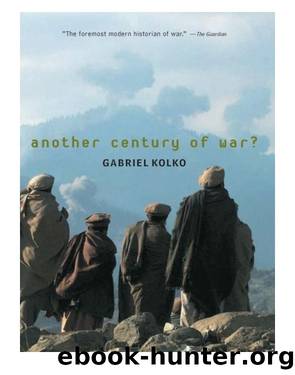Another Century of War? by Gabriel Kolko

Author:Gabriel Kolko
Language: eng
Format: epub
Publisher: The New Press
Published: 2011-06-02T16:00:00+00:00
Coalitions and Strategy: Real and Imagined
The Kosovo war marked the end of NATO as one of the principal means of directly applying U.S. military power in Europe, for it was the first time that NATO had been called upon to function in an actual combat situation. Its inability to act in a timely fashion was partially an inevitable consequence of expanding its membership and extending its potential commitments until they became less and less binding, but it was largely due to the Pentagon’s realization that NATO’s practical encumbrances and time-consuming need to consult its members on routine military decisions made it more a liability than an asset. The war in Afghanistan is a European affair only insofar as a hitherto obscure clause in NATO’s treaty makes an attack on one state an attack on all of them, but this far-fetched contingency was written with a totally different scenario in mind—the USSR was then its sole concern—and when the organization’s membership was much smaller.
But long before September 11, the United States was determined to avoid a repetition of the serious inhibitions that arose with the Kosovo war. The only question was one of timing and how the United States would escape its clear obligations while maintaining its hegemony over its other members. It wished to preserve NATO for essentially the same reasons it had created it: to restrain Europe’s inclinations to create an independent military organization. If Russia reaches even a partial accord with NATO, which is being debated (with Washington often shifting its position and frustrating its nominal allies), then its original function will come to an end and it will exist in name alone. It will then be invoked solely when it suits America’s purposes.
Even before the wars in the former Yugoslavia, the Pentagon was also moving away from the U.S. preoccupation with Europe, a shift that the demise of communism warranted, and focusing its plans far more on the Persian Gulf and especially on East Asia and China. The Bush administration came to office resolved to do less in the Balkans, essentially leaving this responsibility to the United States’ European allies. But it also embarked on a whole string of unilateral gestures, ranging from renouncing the Kyoto agreement to indicating that the 1972 arms control treaty with Russia was soon to become a dead letter. It was openly divided on such issues as relations with China and even Russia, whether to invade Iraq, and how far and fast to go with the ABM system. These internal differences have only intensified since then. America’s reputation for reliability and stability, and its willingness to reshape its treaties and foreign policies as it thought expedient, were immediately called into question.
The events of September 11 compelled the United States to cease temporarily its march toward unilaterism, but it continued trying to attain its objectives in fighting terrorism without sacrificing its goal of greater freedom in its foreign and military policies. Essentially, it embarked on a public relations campaign. But this has strengthened
Download
This site does not store any files on its server. We only index and link to content provided by other sites. Please contact the content providers to delete copyright contents if any and email us, we'll remove relevant links or contents immediately.
| Africa | Americas |
| Arctic & Antarctica | Asia |
| Australia & Oceania | Europe |
| Middle East | Russia |
| United States | World |
| Ancient Civilizations | Military |
| Historical Study & Educational Resources |
The Light of Days by Judy Batalion(827)
Stalin's War: A New History of World War II by Sean McMeekin(688)
Walk in My Combat Boots by James Patterson(614)
The Pacific War 1941-1943 by James Holland(610)
Victory's Price (Star Wars) by Alexander Freed(578)
The Vietnam War: An Intimate History by Geoffrey C. Ward & Ken Burns(570)
First Platoon: A Story of Modern War in the Age of Identity Dominance by Annie Jacobsen(565)
Cold War (Alexander King Book 2) by Bradley Wright(558)
The American War in Afghanistan by Carter Malkasian(555)
Operation Pedestal by Max Hastings(541)
Blood and Ruins: The Great Imperial War, 1931-1945 by Richard Overy(531)
The Madman Theory by Jim Sciutto(521)
Concepts of Space by Jammer Max;(519)
Extreme Fitness by Chris McNab(515)
World War II Infantry Fire Support Tactics by Gordon L. Rottman(503)
Flying Tiger by Samson Jack(501)
Pathfinders by AL-KHALILI JIM(496)
Panzerkrieg by Mike Syron(489)
Hitler’s Pre-Emptive War: The Battle for Norway, 1940 by Henrik O. Lunde(484)
